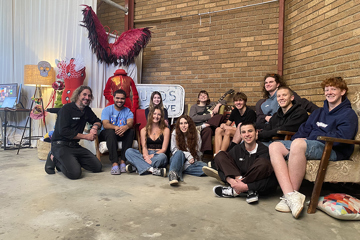You Beauty: The Politics Of Singing In An Aussie Accent
Why don’t more Australians sing in Australian accents?

(Pic by Jordan Munns)

This question has bothered me over the years. I studied music at school in Australia and was involved in various choirs and even – one memorable year – opera lessons. Consistent across these experiences was how we were told to round our vowels, whether singing Pie Jesu or a Christmas song for the school concert. I also recall how, as we sang, we would often automatically adopt more European or American intonation and cadences. But why?
The answer to this question is multifaceted, depending as it does on both the mechanical aspects of singing and the cultural forces that influence musicians and musical norms.
Yet unpacking this question is worth the time. Doing so can shed light on notions of what it means to sing well, or correctly – ideas especially interesting in an Australian context, given Australian English is, outside of Australia, very much considered an off-shoot from a linguistic standard as opposed to a standard in its own right. It also offers the chance to reflect on singers who do sing in Australian accents and the politics behind their decisions.
Vocal mechanics
One reason why people sometimes lose or modify their accents when singing is that the vocal mechanics inherent to singing are different to those of speech, and this can mean that reproducing one’s spoken accent while singing is difficult or impossible.
Don't miss a beat with our FREE daily newsletter
For instance, certain melodies, rhythms, and lyrics demand that singers hold particular syllables for several seconds, which would be different to how they might slur or cut short these syllables in speech. Consequently, certain songs lend themselves more to particular pronunciations and accents than others.
The music of Lana Del Rey, for example, lends itself to a slightly operatic singing style due to her songs’ drawn-out syllables (e.g. Born To Die). Adele, meanwhile, drops her highly distinctive spoken accent in her songs not least because adopting more rounded syllables enables her to project her voice more effectively (e.g. Rolling In The Deep). The glottal stops in her accent (e.g. “kettle” becoming “ket’l” or “ke’l”; “starting” becoming “star’ing”) would also be harder to reproduce when singing, as opposed to the case with a more Americanised accent, which enables words to merge more smoothly into one another – such as with “There’s a fire starding [sic] in my hear[t]…”
Certain musical genres also lend themselves more to certain accents than others, although this is not least in part due to where these genres originated; what their norms consequently are; and what sells.
Genre origins and linguistic biases
Historical and market norms have a significant influence over how singing is performed and judged. Moreover, with many musicians pressured or aiming to maximise their reach and grow their audiences, it is common for professional singers to sing in widely spoken languages (regardless of their mother tongues) and to adopt widely understood accents. Consider ABBA’s choice to sing predominantly in English rather than their native Swedish: this decision arguably enabled them to reach a much wider range of international audiences and studios. Adhering to convention can result more readily in mainstream acceptance and success.
Eschewing convention can also render singers difficult to categorise and market – although of course, some do successfully turn their differences to their advantage. Nevertheless, it would be difficult to market oneself effectively as an indie folk singer with harsh, overstated vocals, or as a US country singer without a passable southern accent or at least a standard pop one (ergo, somewhere on the Dolly Parton-to-Taylor Swift spectrum).
It would also be difficult to convince others that one was singing opera without conforming to certain standards of diction and style that mark songs as belonging to the operatic tradition: for instance, singing from one’s chest (richer, rounder voice; so-called “chest voice”) instead of from one’s head (thinner, flutier voice; so-called “head voice”).
Indeed – an example of genre conventions at work – opera’s Italian origins mean the accent favoured among practitioners, as well as the accent for which many of the songs were written, is an Italian or pseudo-Italian one. Rs are rolled and words like ‘Dio’ (God) are pronounced with a lighter, more Italian emphasis on vowels than in, for example, an Australian accent, which might figure ‘Dio’ closer to how the nation pronounced ‘Rio’ during the 2016 Olympics (“Ree-oh”, complete with diphthong).
Singing ‘correctly’ can be as much about the origins and conventions of genres as it can be about actual technique.
Which languages and accents are ‘right’ for singing?
Growing aware of how different musicians from various backgrounds choose to sing in English has made me more interested in questioning the idea of whether particular languages or accents are indeed ‘right’ or ‘better’ for singing than others.
The question of whether an accent is good or correct in a singing context also brings to mind similar debates linked to linguistic purity, over whether a certain language is a language or dialect – with dialect sometimes being perceived as a non-normative offshoot. Jamaican English, Nigerian English, and Singlish, for example, are not perceived internationally as ‘standard’ versions of the English language – as evidenced by the kind of English that is most typically exported globally; this normalised, enshrined, aspirational version of English tends to be British or American.
There are many instances in which non-mainstream languages, dialects, and accents have been perceived as Other across history and have consequently been perceived as inferior as well.
Therefore, in judging whether a language or an accent is ‘right’ in singing, to what extent does this judgement reflect less a vocal mechanics consideration, and more a prejudice or scepticism towards particular accents and those who possess them?
Vocal mechanics and voice projections play a role in singing accent decisions, granted. For instance, as I recently learnt at a British-Australian wedding, it is easier to belt out Whitney Houston’s classic line “Ooh, I wanna dance with somebody!” in an American accent, wherein both the ‘I’ and the ‘o’ of the sentence are pronounced more like ‘ah’, than in an Australian accent, in which the vowels are longer and more distinct from one another.
Nevertheless, examples like these ought not necessarily to indicate that American accents are somehow more suitable for singing than less mainstream accents, such as Australian ones. It is perhaps rather that singing in an American accent seems easy and ‘right’ above all because doing so is familiar, including to many native English speakers from outside of America.
Consequently, it is worth questioning whether the musicians who do sing in non-American or non-SE-England accents are too often classified as ‘other’: finding themselves in categories such as ‘folk’ or perhaps ‘alternative’, or the staggeringly exoticist category of ‘world’. Perhaps it is time genre became less constricted, or that producers and audiences challenged themselves to question further what sounds ‘normal’ to them, and why this might be.
Australian accents in song
While plenty of Australian singers can and do perform in American accents – take Olivia Newton-John, Keith Urban, Kylie Minogue, Sia, or Nick Cave – some also deliberately buck this trend, like John Schumann, Missy Higgins, John Williamson, Slim Dusty, Courtney Barnett, and Tim Minchin. These last three notably also combine song with comedy, potentially leaning into the humorous quality that is sometimes attributed to Australian accents, which have a minor reputation for sounding entertaining to those unfamiliar with them.
Singing in an Australian accent is not just an aesthetic choice: it is also a political one. Doing so helps represent and celebrate Australian culture and vernacular, including on a global stage, as well as to break down antiquated notions of ‘correct’ speech.
It can enable singer-songwriters to explore new creative avenues in terms of melody and cadence. Importantly, it also paves the way for a broadening of Australian music and of the kinds of music produced and promoted by agents and studios. Indigenous rapper Baker Boy, for example, sings not only in an Australian accent, but also in his mother tongue Yolŋu Matha – and, happily, is lauded, rather than limited by old-school musical conventions, for his preference to create bilingual songs.
It is through recognising the value of Australia’s many cultures, languages, and accents – including in song – that Australia will develop an even more expansive and distinctive music industry. If Australian musicians wish to sing in American accents, naturally, this can be a good and exciting decision too, especially if for them, their song lends itself to being sung in that particular way.
However, ours might become a more interesting music industry if we consider singing in Australian accents just as valid and full of potential as imitating the accents of others in song. What avenues have been hereto underexplored owing to limiting conventions, and to outdated ideas of who and what gets to count as the norm?
Related Gigs











